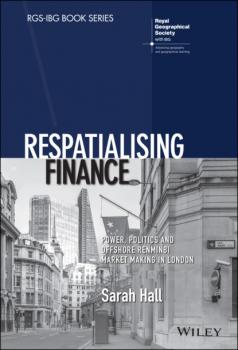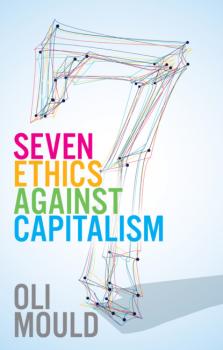География
Различные книги в жанре ГеографияRespatialising Finance
RESPATIALISING FINANCE ‘In Respatialising Finance Sarah Hall uses the internationalisation of the Chinese Renminbi (RMB) to work through a sympathetic conceptual and empirical critique of prevailing analyses of International Financial Centres (IFCs). Her conceptual (re)framing stresses the politics, institutions and economics of IFCs and will be essential reading for all social scientists interested in the dynamism of contemporary finance and financial centres.’Professor Jane Pollard, Centre for Urban and Regional Development Studies (CURDS), Newcastle University, UK‘Through detailed study of Chinese RMB internationalisation and combining analytical insights from economic geography, sociology, and international political economy, Sarah Hall shows why offshore networks anchored in territories such as the City of London are both core to global monetary and financial landscapes, and provide a key terrain for state power and politics.’Professor Paul Langley, Department of Geography, Durham University, UK Respatialising Finance is one of the first detailed empirical studies of how and why London became the leading western financial centre within the wider Chinese economic and political project of internationalising its currency, the renminbi (RMB). This in-depth volume examines how political authorities in both London and Beijing identified the potential value of London’s international financial centre in facilitating and legitimising RMB internationalisation, and how they sought to operationalise this potential through a range of market-making activities.The text features original data from on-the-ground research in London and Beijing conducted with financial and legal professionals working in RMB markets and offers an original theoretical approach that brings economic geography into closer dialogue with international political economy. Recent work on territory illustrates how financial centres are not simply containers and facilitators of global financial flows – rather they serve as territorial fixes within the dynamic and crisis-prone nature of global finance.
Reconstructing Earth's Climate History
Reconstructing Earth’s Climate History There has never been a more critical time for students to understand the record of Earth’s climate history, as well as the relevance of that history to understanding Earth’s present and likely future climate. There also has never been a more critical time for students, as well as the public-at-large, to understand how we know , as much as what we know , in science. This book addresses these needs by placing you, the student, at the center of learning. In this book, you will actively use inquiry-based explorations of authentic scientific data to develop skills that are essential in all disciplines: making observations, developing and testing hypotheses, reaching conclusions based on the available data, recognizing and acknowledging uncertainty in scientific data and scientific conclusions, and communicating your results to others.The context for understanding global climate change today lies in the records of Earth’s past, as preserved in archives such as sediments and sedimentary rocks on land and on the seafloor, as well as glacial ice, corals, speleothems, and tree rings. These archives have been studied for decades by geoscientists and paleoclimatologists. Much like detectives, these researchers work to reconstruct what happened in the past, as well as when and how it happened, based on the often-incomplete and indirect records of those events preserved in these archives. This book uses guided-inquiry to build your knowledge of foundational concepts needed to interpret such archives. Foundational concepts include: interpreting the environmental meaning of sediment composition, determining ages of geologic materials and events (supported by a new section on radiometric dating), and understanding the role of CO2 in Earth’s climate system, among others. Next, this book provides the opportunity for you to apply your foundational knowledge to a collection of paleoclimate case studies. The case studies consider: long-term climate trends, climate cycles, major and/or abrupt episodes of global climate change, and polar paleoclimates. New sections on sea level change in the past and future, climate change and life, and climate change and civilization expand the book’s examination of the causes and effects of Earth’s climate history.In using this book, we hope you gain new knowledge, new skills, and greater confidence in making sense of the causes and consequences of climate change. Our goal is that science becomes more accessible to you. Enjoy the challenge and the reward of working with scientific data and results! Reconstructing Earth’s Climate History, Second Edition, is an essential purchase for geoscience students at a variety of levels studying paleoclimatology, paleoceanography, oceanography, historical geology, global change, Quaternary science and Earth-system science.
Seven Ethics Against Capitalism
Capitalism has become so dominant that it is difficult to ever imagine a world in which its injustices and inequalities are not violently present. In this ambitious and compelling book, Oli Mould turns his diagnosis of capitalism's perversions towards defining the new set of ethics we need to succeed in organizing a more just society. In the wake of the coronavirus pandemic, capitalism has been rocked to its foundations and 'the commons' as a means of providing for all people in our world has come crashing into the foreground. However, in order for the commons to be a viable alternative to the injustices of capitalism, it needs to be grown to a planetary scale. This is not an easy process, but if we can commit to act ethically in the world, then suddenly anything is possible. Blending theoretical thinking and real-life examples of commoning in action, Mould guides the reader through a suite of ethical mindsets – mutualism, transmaterialism, minoritarianism, decodification, slowness, failure and love – which can stand firm against capitalism's seemingly inexorable ability to co-opt and subsume all before it. When thought of collectively, these ethics can offer tantalizing visions and practical approaches towards a world beyond capitalism.
Biogeography in the Sub-Arctic
There is no escaping the fact that the island biogeography of the North Atlantic Region is singularly peculiar. Sitting in the north of the Atlantic Ocean, these islands have been subjected to largescale shifts in climate over the last few million years, unlike the other island groups further south which were likely more buffered from the vicissitudes of Quaternary climate changes. Uniquely for a group of islands there is only one documented extinction in the North Atlantic (the Great Auk), and those in the insects are local events relating to species that are distributed throughout the Palaearctic region. Over half the insect species in Iceland and Greenland are introduced. The faunas, excluding Greenland, are predominantly of Palaearctic origin and have close affinities with the faunas of Scandinavia and the British Isles and. These unique physical and biological characteristics have interested biologists and biogeographers for centuries. The key debates concerning the biogeography of the North Atlantic islands still rumble on: Do the biota reflect cryptic refugia or otherwise, or tabula rasa and recolonization? How important were human communities in shaping the existing biota and biogeographical patterns? Throw into this mix current concerns over global warming, and we can now ask, how resilient is the biota to change, either natural or anthropogenic? This volume draws together a range of researchers with longstanding research interests in the region, from diverse academic backgrounds, to evaluate some of these questions.
Marktsegmente des Tourismus
Der Studienband setzt sich mit insgesamt sechs Marktsegmenten des Tourismus auseinander. Dabei handelt es sich um die Marktsegmente, die in jüngerer Zeit eine große (ökonomische) Bedeutung für den touristischen Markt haben, und eine große Dynamik aufweisen, die insbesondere in der steigenden Nachfrage zum Ausdruck kommt. Die Marktsegmente werden hinsichtlich ihrer Anforderungen an das ursprüngliche und abgeleitete Angebot analysiert, weiterhin werden die aktuellen Strukturen und jüngeren Entwicklungen sowohl auf der Angebots- als auch auf der Nachfrageseite dargestellt. Ein einführendes Kapitel zu Segmentierungsmöglichkeiten des Marktes sowie ein zusammenfassendes Schlusskapitel, das die wesentlichen Herausforderungen thematisiert, vor denen die ausgewählten Marktsegmente zukünftig stehen werden, ergänzen den Band.
Plattentektonik
Wie entstehen Gebirge? Warum entfernt sich Amerika von Europa? Wieso passen die Formen von Südamerika und Afrika so gut zusammen? Warum gibt es rund um den Pazifik lauter Vulkane und Erdbebengebiete, während die Ränder des Atlantischen Ozeans eher ruhig sind? Frisch und Meschede vermitteln umfassend alle geodynamischen Prozesse und zeichnen die Entwicklung von der Theorie der Kontinentverschiebung zum Konzept der Plattentektonik nach. Konkrete Beispiele aus allen Teilen der Erde und hervorragende Schaubilder und Karten machen dieses Standardwerk zu einem Lesegenuss.
The Travels of Sir John Mandeville
The Travels of Sir John Mandeville. Itinerarium
libreka classics – These are classics of literary history, reissued and made available to a wide audience. Immerse yourself in well-known and popular titles!









